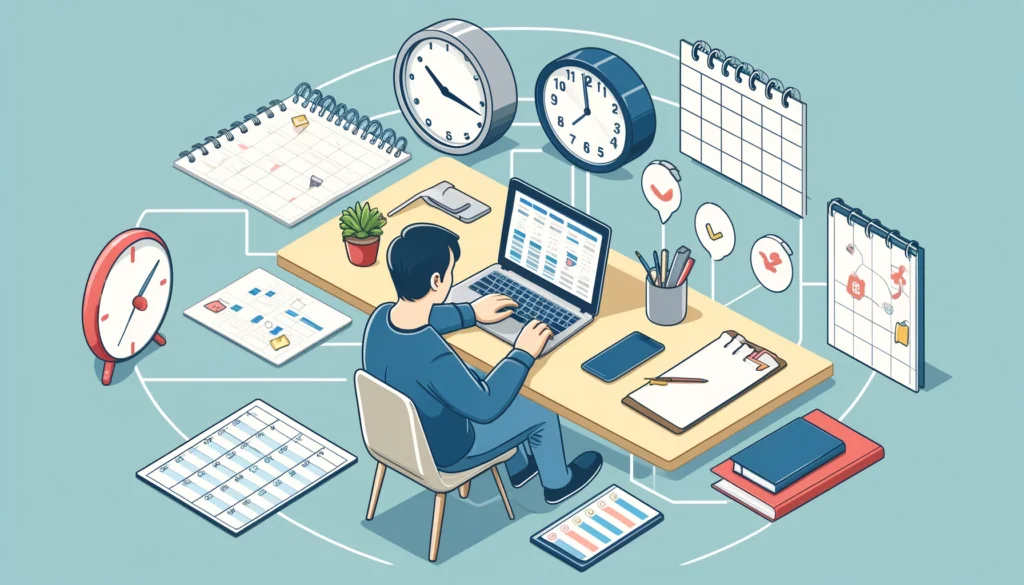Mastering Time Budgeting for Optimal Productivity

Understanding Time Budgeting
Time budgeting is a systematic approach to managing your time by allocating specific time blocks to different tasks and activities. This method helps in prioritizing tasks, avoiding procrastination, and ensuring that you are working efficiently towards your goals. In the fast-paced world of remote work, time budgeting becomes crucial for maintaining productivity and achieving a work-life balance.
Benefits of Time Budgeting
Implementing time budgeting in your daily routine can yield numerous benefits, including:
- Increased Productivity: By organizing your time, you can focus on important tasks without unnecessary distractions.
- Better Work-Life Balance: Allocating time for both work and personal activities ensures a balanced life.
- Reduced Stress: Knowing that you have scheduled time for all tasks can alleviate stress and anxiety.
- Improved Focus: Time budgeting allows you to concentrate on one task at a time, enhancing your focus and efficiency.
Steps to Create an Effective Time Budget
Identify Your Priorities
The first step in creating a time budget is identifying your priorities. Determine which tasks are most important and need to be completed first. Make a list of all the tasks you need to accomplish, both work-related and personal.
Estimate Time for Each Task
Once you have identified your priorities, estimate the amount of time each task will take. Be realistic in your estimates to avoid overloading your schedule. Consider using a time-tracking tool like Deskcove to accurately measure how long you spend on various tasks.
Create a Daily Schedule
With your priorities and time estimates in hand, create a daily schedule. Allocate specific time blocks for each task, and ensure that you include breaks and downtime to prevent burnout. Use tools like Deskcove to set reminders and keep track of your schedule.
Review and Adjust
Your initial time budget might not be perfect, and that’s okay. Regularly review your schedule to see what is working and what isn’t. Adjust your time budget as needed to accommodate new tasks or changing priorities.
Common Time Budgeting Mistakes to Avoid
Overcommitting
One common mistake in time budgeting is overcommitting. Trying to fit too many tasks into your schedule can lead to burnout and decreased productivity. Be realistic about what you can accomplish in a day.
Neglecting Breaks
Another mistake is neglecting to schedule breaks. Taking regular breaks is essential for maintaining focus and energy levels. Ensure that your time budget includes short breaks throughout the day.
Ignoring Personal Time
It’s easy to focus solely on work tasks when creating a time budget, but personal time is equally important. Allocate time for activities you enjoy and for spending with loved ones to maintain a healthy work-life balance.
Time Budgeting Techniques
The Pomodoro Technique
The Pomodoro Technique involves working for 25 minutes, followed by a 5-minute break. After completing four work intervals, take a longer break of 15-30 minutes. This method helps maintain focus and prevents burnout.
Time Blocking
Time blocking involves dividing your day into blocks of time, each dedicated to a specific task or activity. This technique ensures that you have sufficient time for all your priorities and prevents multitasking.
Eisenhower Matrix
The Eisenhower Matrix helps in prioritizing tasks by dividing them into four categories:
- Important and Urgent: Tasks that need immediate attention.
- Important but Not Urgent: Tasks that are important but can be scheduled for later.
- Not Important but Urgent: Tasks that are urgent but not critical.
- Not Important and Not Urgent: Tasks that can be eliminated or delegated.
Utilizing Deskcove for Time Budgeting
Deskcove is a powerful time-tracking tool that can help you implement and maintain your time budget. Here are some features of Deskcove that can enhance your time management:
- Time Tracking: Track how much time you spend on different tasks to gain insights into your productivity.
- Task Management: Organize your tasks and set deadlines to ensure timely completion.
- Reminders and Alerts: Set reminders for important tasks to stay on track.
- Reports and Analytics: Generate reports to analyze your time usage and make informed adjustments to your schedule.
Integrating Time Budgeting into Remote Work
Set Clear Boundaries
When working remotely, it’s crucial to set clear boundaries between work and personal time. Establish a dedicated workspace and stick to a regular schedule to maintain a healthy work-life balance.
Communicate Effectively
Effective communication with your team is essential for remote work. Use tools like Deskcove to share your availability and ensure that everyone is on the same page.
Utilize Technology
Leverage technology to streamline your workflow. Use project management tools, communication platforms, and time-tracking software like Deskcove to stay organized and productive.
Tips for Staying Consistent with Your Time Budget
Review Your Goals Regularly
Regularly reviewing your goals and priorities helps ensure that your time budget aligns with your objectives. Adjust your schedule as needed to stay on track.
Stay Flexible
While it’s important to stick to your time budget, be flexible when necessary. Unexpected tasks or changes in priorities may require adjustments to your schedule.
Practice Self-Discipline
Maintaining a time budget requires self-discipline. Stay committed to your schedule and avoid distractions to achieve your goals.
FAQs
What is time budgeting?
Time budgeting is the practice of allocating specific time blocks to various tasks and activities to manage your time efficiently and improve productivity.
How can time budgeting improve productivity?
Time budgeting helps prioritize tasks, reduces distractions, and ensures that you are focusing on important activities, leading to increased productivity.
What are some common time budgeting techniques?
Common time budgeting techniques include the Pomodoro Technique, time blocking, and the Eisenhower Matrix.
Why is it important to include breaks in a time budget?
Including breaks in a time budget is essential to maintain focus, prevent burnout, and improve overall productivity.
How can Deskcove help with time budgeting?
Deskcove offers features like time tracking, task management, reminders, and analytics to help you create and maintain an effective time budget.
What are the benefits of time budgeting for remote workers?
Time budgeting helps remote workers set clear boundaries, communicate effectively, and utilize technology to stay organized and maintain a work-life balance.
Embracing the Power of Time Budgeting
Time budgeting is a powerful tool that can transform your productivity and overall well-being. By understanding your priorities, creating a realistic schedule, and using tools like Deskcove, you can take control of your time and achieve your goals. Start implementing these strategies today to experience the benefits of effective time management.

